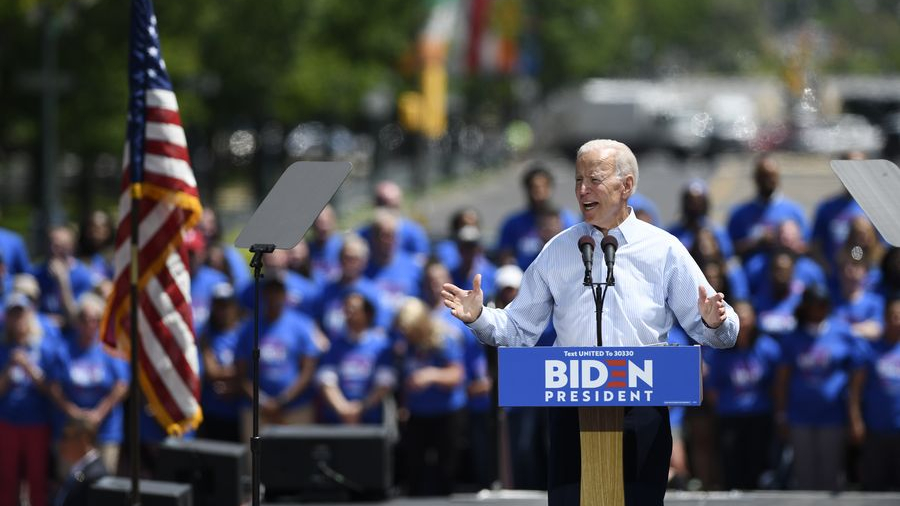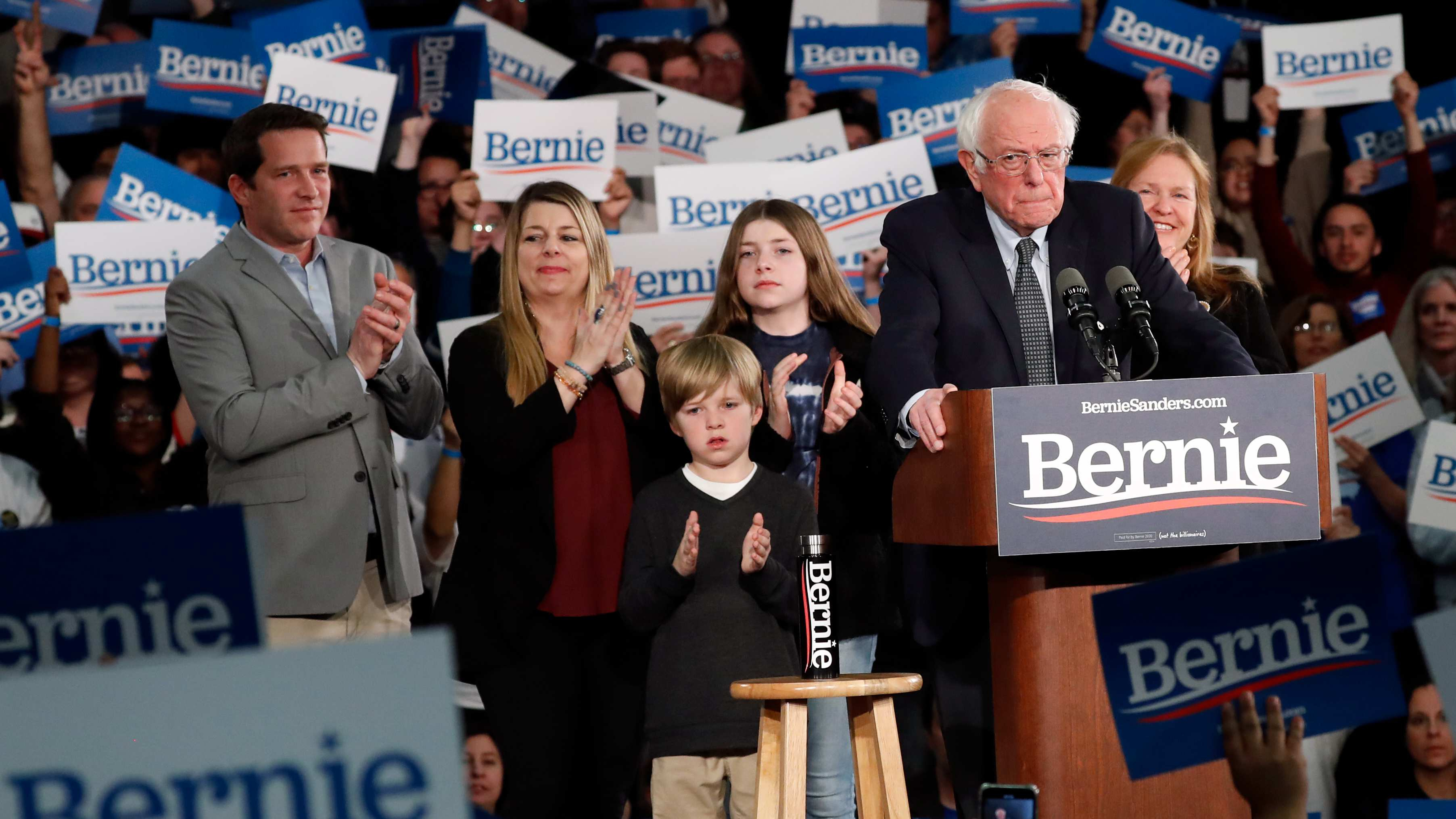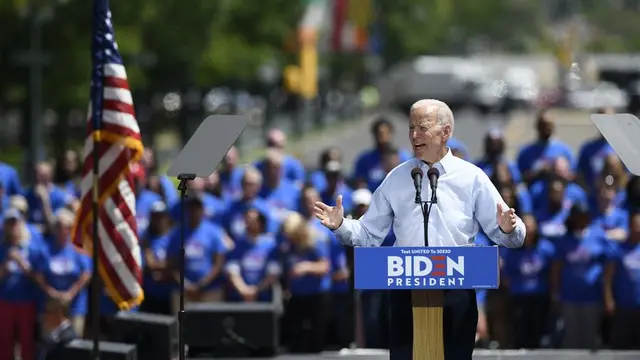
Former U.S. Vice President Joe Biden speaks during a rally in Philadelphia, May 18, 2019. /Xinhua Photo
Editor's note: Hannan Hussain is a security analyst at the South Asia Center, London School of Economics, and an author. The article reflects the author's opinions, not necessarily the views of CGTN.
If there were any questioning why U.S. presidential elections are such a difficult catch, let Super Tuesday serve as a glaring example. Joe Biden emerged as a top pick across the majority of the 14 states, transforming his blowout profile into a Democratic frontrunner. He tightened his grip on the entire South, including states where his presence – of recent – has been a bare minimum.
A double-digit lead now distinguishes Biden from Bernie Sanders, instead of the traditional "moderate-leftist" binary. Despite the latter's remarkable start to the 2020 primaries, he couldn't pull off one of Biden's several tricks on Tuesday: to seize the home states of fellow competitors, and push them on the verge of withdrawal.
From beginning as an underdog to leading the delegates tally, Biden is making a larger point here. He is reinforcing the Democratic establishment's belief that a moderate candidate is best suitedto leverage America's diverse electoral DNA. If Biden's momentum carries unabated throughout much of March, this belief could very well become concrete. But what we know for certain is that his triumph in mighty states like Texas (where Bernie exercised considerable outreach), is proof that the Democratic establishment's trust has merit.
Interestingly, Sanders' resolve to challenge the status quo that allowed the likes of Trump to succeed, is a longstanding featureof his campaign. But after Tuesday's fallout, it is also his weakness.
Consider the fact that any challenge to the Bernie campaign – including greater traction for Joe Biden from within Democratic ranks – is automatically dubbed an ominous move by the "political establishment."
In his interview to ABC News on Monday, Sanders interpreted Biden's support as the coming together of the "political and corporate establishment" – a phrase previously attributed to President Trump.

Democratic presidential candidate Senator Bernie Sanders speaks to supporters at a caucus night campaign rally in Des Moines, Iowa, U.S., February 3, 2020. /AP Photo
The resulting friction between Sanders and select Democrat camps sends mixed signals to his own voters, who may question his ability to reconcile deep-rooted differences in legislative circles, such as the Senate. It is here that Biden offers a mid-way between both promise and impact.His reluctance to extend campaign criticism to his own party, strengthens his case to lead it effectively. Moreover, timely endorsements from former candidates – such as Klobuchar, Buttigiegand most recently Michael Bloomberg– add to his united Democrat persona.
As far as the length and width of Tuesday's victories go, it would be naïve to construe Biden's gains as a reflection of unanimous voter approval. He prevailed largely on the back of a powerful black voter base – in Virginia, over 50 percent of African Americansvouched for Biden, and every six in 10 voters across Texasadded to his mileage in the marquee state.
As I cautioned in my
earlier analysis
, Super Tuesday would end up revealing the distinct voting patterns and preferences among black voters. They have made those preferences crystal clear for the week. It is Biden over Sanders.
But behind Tuesday's triumph is a meagre turnout among Sanders' key voter segments, including the young. Even in states like Alabama and Tennessee, voters between 18-29 constituted some 11 percent of the total turnout. Scaled across all 14 states, that is about two in every 16 voters.
In contrast, the former vice president enjoyed leverage over the 45 or older bracket, which grew sizably. Alabama alone clocked 69percentin total turnout according to exit polls. The hope of getting young people to vote "in a way they have never done before" never fully materialized for Sanders. What did materialize, however, was Biden's surge across moderate and conservative segments.
Bernie's advocates cite his deeply committed support baseas a key ingredient for any Democrat to clinch the presidency this year. The Vermont senator continues to make this point with every Super Tuesday vote that comes in: wider support from issue voters, independents, Hispanics and the young stand stronglywith him. The question is, where is Sanders’ expansion within the same electorate?
Biden seems to be answering that question. He retained his core demographic base, and across 12 states, supplemented it with a nearly 50percenttilt among voters who made their choice in the last few days. Biden even surpassed Sanders in swinging the middle-age segment, which hangs between Sanders' young and Biden's conventional old-age brackets.
It is important to be reminded that the lead is substantive, but far from conclusive. The next two weeks would pledge over 900 candidates, featuring some key states from the North and Midwest. Sanders is also adding to a substantial lead in California– the crown jewel of Super Tuesday. Looping in more delegates by the final count could help narrow the margin of difference with Biden.
Meanwhile, the Vermont senator's critics and competitors are busy arguing that the Bernie revolution has its days numbered. "We were told when you got to Super Tuesday, it would be over. Well, it may be over for the other guy," spoke a euphoric Bidenduring his victory speech.
An increase in voter traction on March 10and 17 could compel that statement to be read in reverse.
(If you want to contribute and have specific expertise, please contact us at [email protected].)
 简体中文
简体中文

